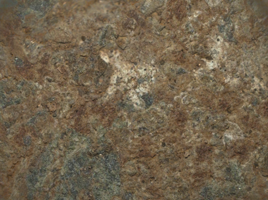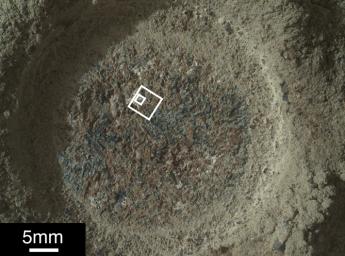
Figure ANASA's Perseverance Mars rover captured this image of a rock target nicknamed "Quartier" with the WATSON (Wide Angle Topographic Sensor for Operations and eNgineering) camera belonging to an instrument called SHERLOC (Scanning Habitable Environments with Raman & Luminescence for Organics & Chemicals). The rover uses a tool to abrade the surface of a rock (as with the circular portion in this image), removing dust, debris and other material that has settled on the rock's outer surface. After that's complete, instruments like SHERLOC can study the rock's composition. The white squares show areas where SHERLOC performed multiple scans with its ultraviolet laser.
SHERLOC detected signals within Quartier consistent with organic, carbon-based molecules. If they are organic molecules – something that could be verified only by bringing the samples to Earth for closer study – they would have likely been formed by geological processes as opposed to ancient biological sources, but they represent the kinds of molecules Perseverance's science team are looking for.
Figure A zooms in on the abraded area within both the white squares in the main image.
A key objective for Perseverance's mission on Mars is astrobiology, including the search for signs of ancient microbial life. The rover will characterize the planet's geology and past climate, pave the way for human exploration of the Red Planet, and be the first mission to collect and cache Martian rock and regolith (broken rock and dust).
Subsequent NASA missions, in cooperation with ESA (European Space Agency), would send spacecraft to Mars to collect these sealed samples from the surface and return them to Earth for in-depth analysis.
The Mars 2020 Perseverance mission is part of NASA's Moon to Mars exploration approach, which includes Artemis missions to the Moon that will help prepare for human exploration of the Red Planet.
JPL, which is managed for NASA by Caltech in Pasadena, California, built and manages operations of the Perseverance rover.
For more about Perseverance:
mars.nasa.gov/mars2020/

 Planetary Data System
Planetary Data System













